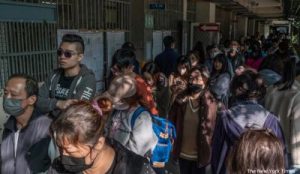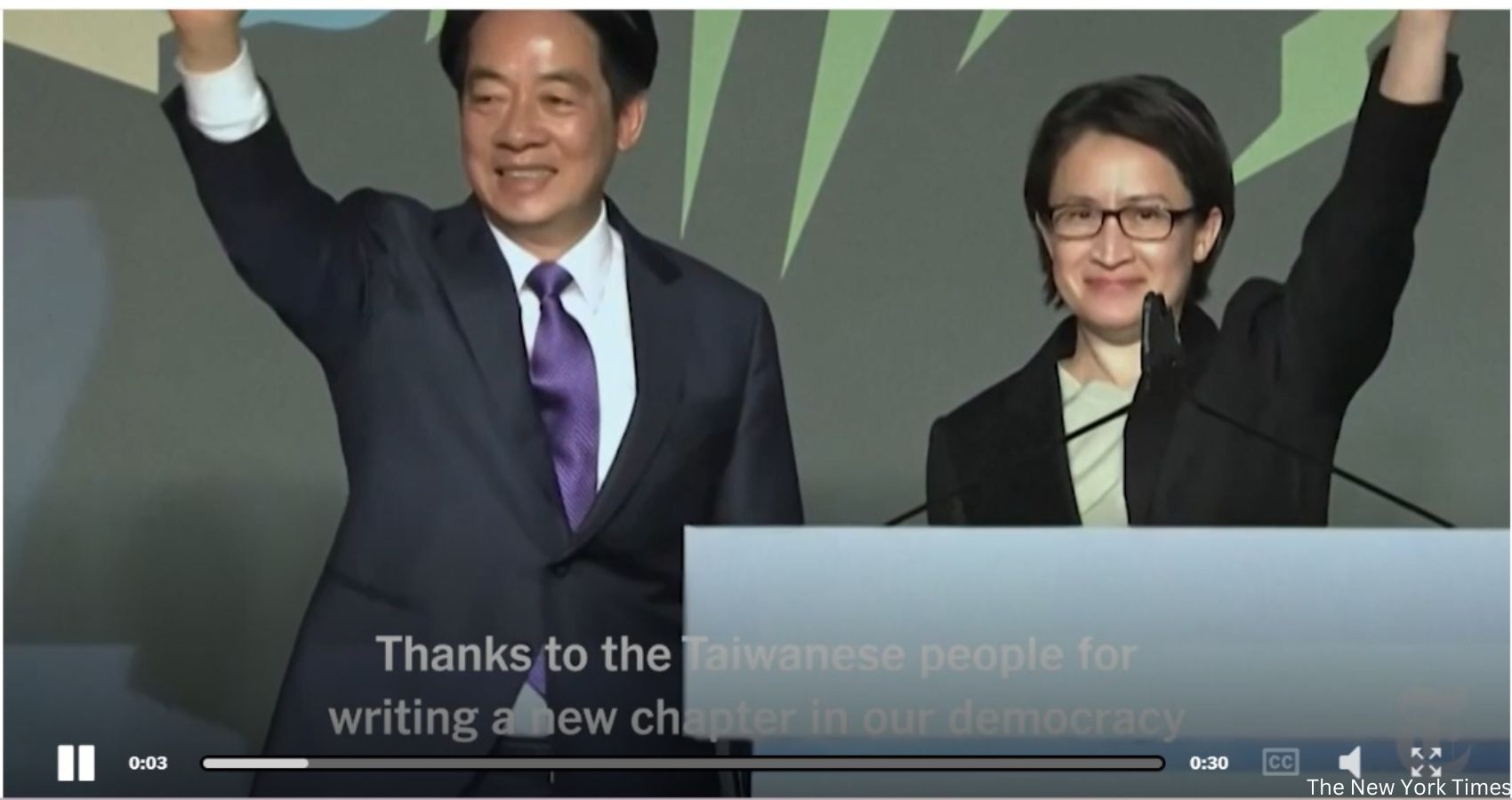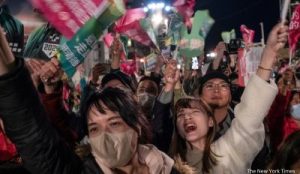 In a surprising turn of events, Taiwanese politician Lai Ching-te, long criticized by China’s Communist Party as a potential catalyst for conflict due to his support for full independence for Taiwan, secured victory in the presidential election. Despite Beijing’s warnings and months of tension, Mr. Lai, currently Taiwan’s vice president, garnered 40 percent of the votes, securing a third consecutive term for his Democratic Progressive Party (D.P.P.), marking a historic achievement since Taiwan began direct democratic elections in 1996.
In a surprising turn of events, Taiwanese politician Lai Ching-te, long criticized by China’s Communist Party as a potential catalyst for conflict due to his support for full independence for Taiwan, secured victory in the presidential election. Despite Beijing’s warnings and months of tension, Mr. Lai, currently Taiwan’s vice president, garnered 40 percent of the votes, securing a third consecutive term for his Democratic Progressive Party (D.P.P.), marking a historic achievement since Taiwan began direct democratic elections in 1996.
The official Beijing news outlet had cautioned that Lai’s presidency could lead Taiwan “on a path of no return,” but the Taiwanese people, with a robust voter turnout of 72 percent, voiced their support for him. Addressing his enthusiastic supporters outside the D.P.P. headquarters in Taipei, Lai emphasized unity and his commitment to defending Taiwan’s identity in the face of increasing external pressures.
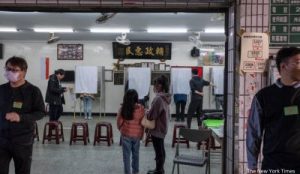 “I voted for Lai Ching-te because I think he can handle the relationship with China wisely,” expressed Hsu Ya-hsuan, a 28-year-old technology company product manager in Taipei. Many share her sentiment, hopeful that Lai will navigate the delicate balance between protecting Taiwan’s sovereignty and avoiding deliberate provocations against China.
“I voted for Lai Ching-te because I think he can handle the relationship with China wisely,” expressed Hsu Ya-hsuan, a 28-year-old technology company product manager in Taipei. Many share her sentiment, hopeful that Lai will navigate the delicate balance between protecting Taiwan’s sovereignty and avoiding deliberate provocations against China.
As the newly elected president, Lai faces formidable challenges, both domestically and internationally. Despite the victory, his party lost its legislative majority, posing obstacles to advancing his political agenda. Externally, China’s response to his election remains a critical concern, with expectations of increased pressure and aggression, both militarily and economically.
According to Jason Hsu, a former legislator and current Mason Fellow at Harvard Kennedy School, Lai will encounter a challenging and divided political landscape domestically, lacking the honeymoon period enjoyed by his predecessor. The loss of the legislative majority adds another layer of complexity to governing during a precarious time for Taiwan.
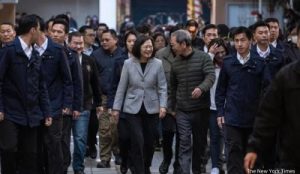 Contrary to the reckless firebrand image projected by Beijing, those who know Lai affirm that he campaigned on continuity with the policies of the outgoing president, Tsai Ing-wen. Lai’s commitment to building Taiwan’s military defenses, strengthening relations with democratic allies, and avoiding a complete rupture with China echoes Tsai’s approach. However, the intensifying pressure from China and the potential for military action create a testing ground for Lai’s political and diplomatic skills.
Contrary to the reckless firebrand image projected by Beijing, those who know Lai affirm that he campaigned on continuity with the policies of the outgoing president, Tsai Ing-wen. Lai’s commitment to building Taiwan’s military defenses, strengthening relations with democratic allies, and avoiding a complete rupture with China echoes Tsai’s approach. However, the intensifying pressure from China and the potential for military action create a testing ground for Lai’s political and diplomatic skills.
In response to Lai’s victory, the Chinese government office for Taiwan affairs dismissed the D.P.P. as not representing mainstream opinion on the island. The U.S. Secretary of State, Antony J. Blinken, issued a congratulatory statement, expressing eagerness to work with the new Taiwanese leader. However, Lai’s tenure will be closely scrutinized by China, which may employ tactics such as trade restrictions, diplomatic maneuvers, or military exercises to assert its influence.
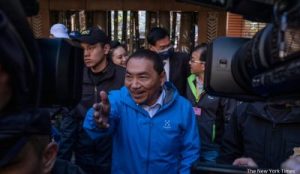 Kuo Yu-jen, a political science professor, warns that even if Lai adheres to Tsai’s policies, China’s President Xi Jinping is unlikely to alter the trajectory of solving the “Taiwan problem” at an accelerated pace. The pressure on Lai’s government is anticipated to surpass that experienced during Tsai’s eight years in office.
Kuo Yu-jen, a political science professor, warns that even if Lai adheres to Tsai’s policies, China’s President Xi Jinping is unlikely to alter the trajectory of solving the “Taiwan problem” at an accelerated pace. The pressure on Lai’s government is anticipated to surpass that experienced during Tsai’s eight years in office.
Taiwan’s relations with the United States also hang in the balance, with continued U.S. support promised in the face of Chinese pressure. However, the U.S. is entangled in global conflicts, and the outcome of the upcoming presidential election in November could introduce further uncertainties for Taiwan.
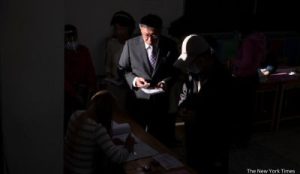 In addition to external challenges, Lai must grapple with a divided domestic political landscape. His chief rivals garnered significant shares of the vote, posing a potential threat to his authority. Ko Wen-je of the Taiwan People’s Party, in particular, tapped into public dissatisfaction with rising housing costs, limited career prospects, and slow income growth, especially among young supporters. With his party losing its majority in the Legislative Yuan, Lai recognizes the need for collaboration with opposition parties to address Taiwan’s challenges. Acknowledging the people’s desire for a capable government and effective checks and balances, Lai pledges to respect this new public sentiment.
In addition to external challenges, Lai must grapple with a divided domestic political landscape. His chief rivals garnered significant shares of the vote, posing a potential threat to his authority. Ko Wen-je of the Taiwan People’s Party, in particular, tapped into public dissatisfaction with rising housing costs, limited career prospects, and slow income growth, especially among young supporters. With his party losing its majority in the Legislative Yuan, Lai recognizes the need for collaboration with opposition parties to address Taiwan’s challenges. Acknowledging the people’s desire for a capable government and effective checks and balances, Lai pledges to respect this new public sentiment.
Despite the complexity of these challenges, Lai’s election victory culminated in a week of spirited campaign events and vibrant gatherings across Taiwan, emphasizing the island’s commitment to democracy and separate identity from the mainland. The election’s festive atmosphere showcased the significance of the democratic process for the Taiwanese people, even as they navigate uncertain times and external pressures.
As Lai assumes office in May, the world watches closely to see how he manages the delicate balance between safeguarding Taiwan’s interests and navigating the complex geopolitical landscape in the region.
